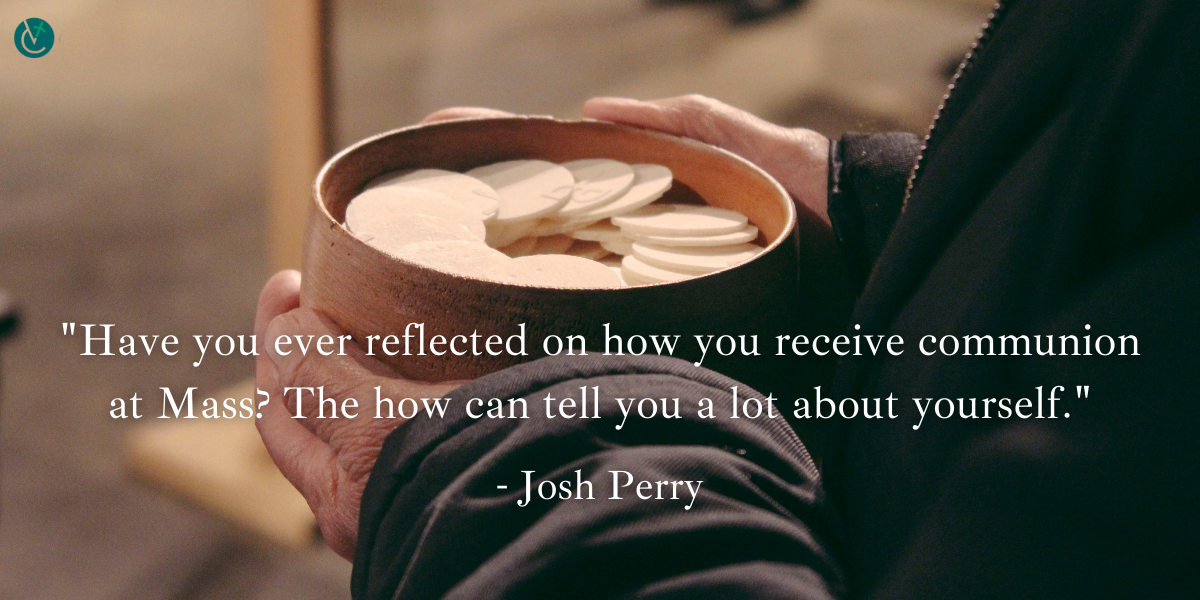
Are you prepared to receive communion?
Have you ever reflected on how you receive communion at Mass? The how can tell you a lot about yourself. How you receive communion can express your reverent faith in the Eucharist — your faith in the God present in the Eucharist. It can express your belief that communion strengthens and nourishes the bonds that make the Church (we call it “communion” for a reason and say that the Eucharist makes the Church). Your how can also betray an indifference to the Eucharist. “Going to Mass is something I just always do, or I’m expected to do, or I’m obligated to do.” Your how can also betray an over-casualness about receiving communion. “God is my friend!” is fine and good until that sentiment obscures the fact that your friend is also your creator and savior. So how do we get the how right? How do we receive communion at Mass?
The Church teaches that a Catholic must be properly disposed to receive communion. At a minimum, this requires that one not be conscious of having committed any mortal sin without sacramental absolution (going to confession) and having fasting from food and drink (with the exception of water and medicine) for one hour prior to receiving communion. Those obstinately persevering in manifest grave sin are also not considered properly disposed and ought not receive communion. Beyond these minimum requirements, is there anything else to being properly disposed to receive communion? Turns out there is, and the key is in the celebration of Mass itself.
The Church calls each of us to full, active and conscious participation in the Mass, which is both internal and external. Through such participation, the faithful “derive the true Christian spirit” (Sacrosanctum Concilium 14). The first act of participation is to show up! There’s a lot to be reflected upon in this very act of showing up. Although it may not seem like it (especially if we’re attending Mass out of a sense of obligation), our spirits are drawn to Mass. Before our decision to get out of bed and attend Mass, there is Jesus’ invitation to us: “I have earnestly desired to eat this Passover with you” (Lk 22:15). As Pope Francis reflects in his newly-issued Apostolic Letter “Desiderio Desideravi” (DD), “every time we go to Mass, the first reason is that we are drawn there by [Jesus’] desire for us. For our part, the possible response … is that surrender to this love, that letting ourselves be drawn by him” (6). In this first act of full, active and conscious participation, we find our soul’s surrendering to Jesus’ love. In this surrender, we move closer to the Eucharist.
Full, conscious and active participation creates in us a spirit of humility as it situates us (as created beings) before the creator in a posture of worship. Participation in the liturgy helps us avoid “spiritual worldliness” as Pope Francis puts it by freeing us “from the prison of a self-referencing nourished by one’s own reasoning and one’s own feeling” (DD 19) and from the “presumption of salvation earned through our own efforts” (DD 20). The liturgy is ultimately not of our own making. Liturgy, celebrated well and reverently, pulls us out of ourselves and our own interests. It even can (and should) move us beyond our own preferences for what we “like” or “don’t like” in the liturgy. To fully, consciously and actively participate in the liturgy means that “we have no other boast but the cross of our Lord Jesus Christ!” (cf. Gal. 6:14, DD 20). In this humility, formed by active participation in the liturgy, we move closer to the Eucharist.
Thus, the liturgy itself teaches and helps us be properly disposed for receiving the Eucharist in communion. Surrendering to the presence of God by showing up and standing in the presence of God in humility by fully, actively and consciously participating in the liturgy leads us to a sense of wonder and awe, which Pope Francis points out (DD 24-26). He notes that we stand in wonder and awe not before a mysterious, totally transcendent God hidden in mysterious ritual, but before something already revealed and proclaimed: a transcendent God who desires communion with us so much so that He came to dwell among us in His incarnation and opened the doorway for us for eternal communion with God through the Paschal Mystery. We participate in this reality of Jesus’ Incarnation and Paschal Mystery every time we receive the Eucharist!
Thus, in showing up and participating fully, consciously and actively in the liturgy, we approach the Eucharist with the proper disposition: surrendered to God, humbled before God and in amazement at what God has done – and continues to do – for us!
—Josh Perry is director of the Office of Worship for the Diocese of Burlington.
—Originally published in the Fall 2022 issue of Vermont Catholic magazine.

